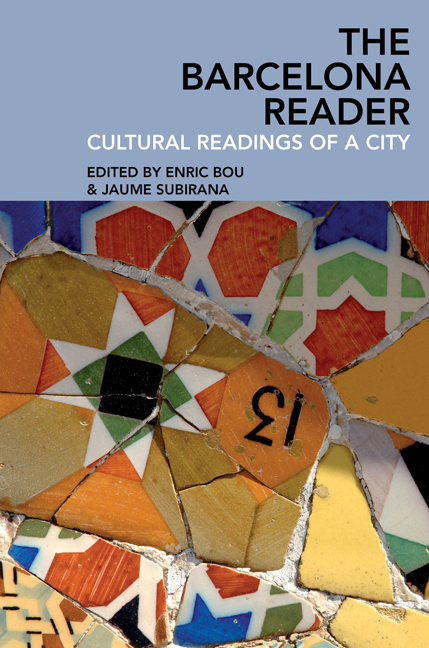Book contents
- Frontmatter
- Contents
- List of illustrations
- Notes on contributors
- Introduction: Barcelona: Cultural readings of a city
- I City, history, and territory
- 1 Barcelona: The siege city
- 2 Barcelona as an adaptive ecology
- 3 A present past, Barcelona street names, from Víctor Balaguer to Pasqual Maragall
- 4 ‘The asylum of modern times’: Barcelona and Europe
- 5 A fragile country
- II City and society
- III Art, architecture, and the city
- IV The Olympics and the city
- V Literature, cinema, and the city
5 - A fragile country
from I - City, history, and territory
- Frontmatter
- Contents
- List of illustrations
- Notes on contributors
- Introduction: Barcelona: Cultural readings of a city
- I City, history, and territory
- 1 Barcelona: The siege city
- 2 Barcelona as an adaptive ecology
- 3 A present past, Barcelona street names, from Víctor Balaguer to Pasqual Maragall
- 4 ‘The asylum of modern times’: Barcelona and Europe
- 5 A fragile country
- II City and society
- III Art, architecture, and the city
- IV The Olympics and the city
- V Literature, cinema, and the city
Summary
I was on the steps of the Cathedral in the early evening, the hour before twilight one day during the last week of April, when I saw the first swifts diving and darting across the sky. I watched how they suddenly seemed frenetic and out of control, and then how they glided calmly for a while over the Hotel Colon and the Via Laietana.
I remembered seeing them for the first time during the April of 1977 when it was still unclear how things would work out here, when everybody held their breath, united in wanting autonomy for Catalonia. It must have been the feast of Sant Jordi, and there were crowds of people in the Plaça de Sant Jaume. The stone plaque announcing that the Civil War was over and the ‘red army’ had been defeated by Franco was still on the wall of the Town Hall. I remember someone saying that it would be easy now to take it down or deface it, since the square was so full.
They called out for sweet liberty that day, a few months before they broke into factions and political parties. The same day the first brave swifts came back to the city.
Eleven years later, that week in April 1988 was a good lesson for me, in case I had forgotten, that everything was still political here, that politics was the mould in which everything was shaped: from art to religion, from football to a visit by the King of Spain.
He was scheduled to come to Barcelona on 23 April, the eve of the feast of Sant Jordi, the patron saint of Catalonia whose killing of the dragon was depicted on tapestries, stained glass windows and paintings all over Catalonia. His visit was to celebrate the Millennium of Catalonia at a function in the Palau de la Generalitat. No one believed much in the historical veracity of the Millennium, and it was perhaps no coincidence that within five weeks Jordi Pujol, President of the Generalitat, and his Government would seek a third term in office, which they would win.
There were posters all over the city protesting against the visit. Some depicted Pujol, a small man at the best of times, sitting on the king's knee.
- Type
- Chapter
- Information
- The Barcelona ReaderCultural Readings of a City, pp. 131 - 142Publisher: Liverpool University PressPrint publication year: 2017



